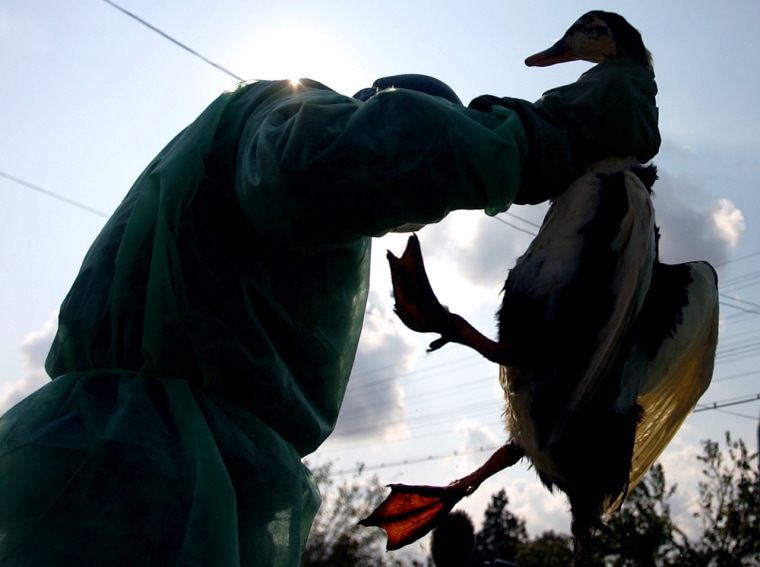Authorities were culling thousands of domestic birds in the Danube Delta region Sunday to prevent the spread of a deadly strain of bird flu that has decimated flocks and killed dozens of people in Asia.
Officials said they were also awaiting test results from a British laboratory on samples from birds found dead in Maliuc, a village about 30 kilometers from Ceamurlia de Jos, where the H5N1 bird flu strain was first detected in Romania.
Authorities around the world fear the H5N1 strain could mutate into a form that can be passed among people, leading to a flu pandemic which some say could potentially kill millions.
The strain has already appeared in Turkey, and the European Union has banned all poultry imports from Turkey and Romania. The EU's top public health official, Health Commissioner Markos Kyprianou, said Saturday no further measures to prevent the disease spreading from Romania and Turkey were immediately needed.
Turkish authorities said Sunday that the outbreak in the western village of Kiziksa had been contained, while initial lab tests conducted after about 1,000 chickens died in eastern Turkey showed no signs of bird flu.
Romanian officials said all domestic birds in Ceamurlia de Jos were killed and the village was being disinfected, but the area would remain under quarantine for 21 days before it could be declared free of the virus.
"We finished (killing domestic fowl) in Ceamurdia de Jos," said Gabriel Predoi, who heads the national Agency for Animal Health. He said authorities hoped to complete the bird cull in Maliuc on Sunday.
Officials in protective suits were spraying disinfectant in residents' yards and homes in both villages, including around refrigerators, kitchens and other areas which may have come into contact with infected birds.
Both Ceamurlia de Jos and Maliuc are in the quarantined eastern province of Dobrogea. All cars, trucks and trains traveling between Dobrogea and the rest of the country are being disinfected, while authorities have increased the surveillance of domestic birds in neighboring areas, Agriculture Minister Gheorghe Flutur said.
The two villages are under even stricter regulations, with police restricting access to them. Authorities have also banned farmers in surrounding areas from leaving birds and animals outside, for fear they could come in contact with wild migratory birds carrying the virus.
Flutur said anyone not keeping domestic birds confined could face fines. He said he flew over the region by helicopter and saw that some residents in neighboring counties were not complying with the order. About three-fourths of Romania's estimated 100 million birds live on small farms, which makes it more difficult to fight bird flu, he said.
Flutur said tests in areas surrounding Ceamurlia de Jos and Maliuc showed the virus had not spread to other regions and that the tight quarantine measures were working. Tests on 15 swans that died Friday on the nearby Obretinul Mic lake proved negative for the virus, he said.
Flutur met Sunday with his Moldovan counterpart Anatol Gorodenco and pledged cooperation to stamp out the virus from the region. Moldova and Ukraine neighbor the Danube Delta, a large nature reserve where millions of migratory birds have been arriving from Russia and are believed to have carried the virus.
"This virus has no borders," Flutur said, adding that countries must work together to stop its spread.
Prime Minister Calin Popescu Tariceanu said the United States offered assistance to Romania in dealing with the avian flu crisis, while Flutur said the EU also offered help.
Flutur said Bucharest had responded to both that no assistance was immediately needed, but that the Agriculture Ministry was drawing up a list of what might be necessary if the virus spreads.
Although H5N1 is highly contagious among birds, it is difficult for humans to contract. Still, it has killed about 60 people in Asia, mostly poultry farmers infected directly by birds, since 2003.
Stamping out the outbreaks in poultry swiftly is important for human health because the further the virus is allowed to spread, the more opportunities it has to mutate into a form that passes easily to and between people, sparking a human flu pandemic.
In 1918, an influenza pandemic believed to have originated in birds killed more than 40 million people around the world. Subsequent pandemics in 1957 and 1968 had lower death rates, but caused extreme disruption.
